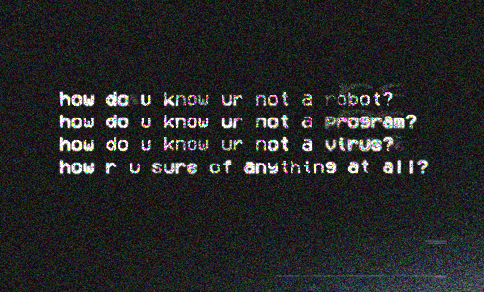Katherine Frances's Blog, page 299
October 16, 2015
k-frances:
–Visceral Definitions by K-frances
–(x)
–(x)
k-frances:
–Visceral Definitions by k-frances
Visceral Definitions are finally finished with the A’s! I had no idea it would take so flipping...
Visceral Definitions are finally finished with the A’s! I had no idea it would take so flipping long, but as celebration I’ll be blogging some favorites :) Then onward to the boundless and bountiful B’s!
get-scribbling:
Write about somebody who begins to figure out...

Write about somebody who begins to figure out they aren’t real. What are they, and how were they created? What made them believe they were real? How did they come across the discovery? What has their entire life been like, and how does it change? What is their reaction?
October 15, 2015
(1/2)I have a question about roots. Basically i have a sort of urban/modern supernatural-ghost-story-esque diddy featuring two black-hispanic siblings who's family is rooted in 'witchcraft'/spiritualism. But I'm in a constant debate of where to really root
Afro Latina and Witchcraft(2/2) of not doing it justice or not representing the beliefs properly– as well as not really even knowing where to start. I don’t really want to rob these kids of their heritage per say, but i don’t really wanna mess it up super bad either, and i find myself really just needing a place to sort of grab my footing in this whole business. Do you have tips, hints, or words of advice when trying to tackle these kinds of conceptual decisions?
Hey there, Anon!
There is NOTHING in this world that you can do that will not be met by criticism. There is NOTHING in this world that you can write without someone criticizing it. Ultimately, my tip is to literally just pick something and run with it. Do it. You’re going to make mistakes. That’s what editing and beta readers are for. You are going to have to edit this thing and re-write it at least twice in the first place, so WHY you have to edit it is arbitrary when THAT you have to edit it is inevitable. Just do it.
Are you afraid of being called out as a racist? Don’t be. What you’re going to be called out as is *ignorant*, which is something you can not help and should not feel bad about – just fix it. If someone says, “This is racist,” listen to them and make edits, and don’t take it personally. You made a decision out of ignorance. Join the club. Learn from it. We all did it, and we all will.
Are you afraid of misrepresentation by omission? Not even Ayn Rand could write a book of a length thorough enough to cover the vast and nuanced subject of Afro-Latino witchcraft/magico-religious practices. Don’t worry about it. Just write your story. Your mission is as a storyteller. You are not an anthropologist on a mission to represent a culture, so don’t try to be one. Be a storyteller. It’s okay if you don’t cover everything. It’s not okay if you don’t tell a story.
Are you afraid that if you mix two beliefs that people will cry “appropriation”? You are dealing with cultural beliefs which are the very result of acculturation. Afro-Latino magicoreligious beliefs are an admixture of many cultures from various extremes of the globe, some of them neither African nor Latino in the most remote sense. For example, hoodoo (an Afro-American magical system which has no liturgical worship elements, distinct from voodoo) is named for the Scottish word for witchcraft. Its rituals and ideas derive from Scottish, West African (from places like present-day Benin, Nigeria, Gabon and the Republic of the Congo), and Native American (I believe mostly Alabama, Choctaw and Coushatta) influences. Within a practice you will have variations (or even contradictions) on how things work, especially rituals, because you’re dealing with a belief system that evolved over time without ANYBODY writing it down for the longest time (due to illiteracy or persecution or both).
This is not, of course, a meal-ticket to copy and paste things willy-nilly, but it is basis for some wiggle-room: you are dealing with a belief set which is the product of acculturation and syncretism. Period. You are dealing with a set of beliefs that one can have multiple memberships in: a Palero can be a Santero who grew up with Espiritísmo. A brujo can have a lot of tricks up his sleeve that he learned from hoodoo, or even use new age healing crystals and it’s no big deal. Some of these beliefs have NO liturgical worship in them and others do, hence their compatibility, just like how you can have Christians who do tarot because tarot cards don’t tell them one way or the other about Jesus, and you have Protestants who are Futurists and who are Preterists within the exact same denomination. Belief is nuanced and rich from person to person, even in the same religion, even in the same denomination, even in the same household.
So, JUST DO IT MAN. When you fall down get up and keep going. When you screw up, fix it. After all, even if you write a book about the culture YOU are intimately familiar with due to being a part of and have NO compunctions about possibly getting anything wrong or mis-representing something, you will STILL have major problems with the book in your first few drafts and you will STILL have to re-write it at least once, probably twice or thrice, hell, maybe nine times. What are you waiting for?
- Rodríguez
(1/2)I have a question about roots. Basically i have a sort of urban/modern supernatural-ghost-story-esque diddy featuring two black-hispanic siblings who's family is rooted in 'witchcraft'/spiritualism. But I'm in a constant debate of where to really root
Afro Latina and Witchcraft(2/2) of not doing it justice or not representing the beliefs properly– as well as not really even knowing where to start. I don’t really want to rob these kids of their heritage per say, but i don’t really wanna mess it up super bad either, and i find myself really just needing a place to sort of grab my footing in this whole business. Do you have tips, hints, or words of advice when trying to tackle these kinds of conceptual decisions?
Hey there, Anon!
There is NOTHING in this world that you can do that will not be met by criticism. There is NOTHING in this world that you can write without someone criticizing it. Ultimately, my tip is to literally just pick something and run with it. Do it. You’re going to make mistakes. That’s what editing and beta readers are for. You are going to have to edit this thing and re-write it at least twice in the first place, so WHY you have to edit it is arbitrary when THAT you have to edit it is inevitable. Just do it.
Are you afraid of being called out as a racist? Don’t be. What you’re going to be called out as is *ignorant*, which is something you can not help and should not feel bad about – just fix it. If someone says, “This is racist,” listen to them and make edits, and don’t take it personally. You made a decision out of ignorance. Join the club. Learn from it. We all did it, and we all will.
Are you afraid of misrepresentation by omission? Not even Ayn Rand could write a book of a length thorough enough to cover the vast and nuanced subject of Afro-Latino witchcraft/magico-religious practices. Don’t worry about it. Just write your story. Your mission is as a storyteller. You are not an anthropologist on a mission to represent a culture, so don’t try to be one. Be a storyteller. It’s okay if you don’t cover everything. It’s not okay if you don’t tell a story.
Are you afraid that if you mix two beliefs that people will cry “appropriation”? You are dealing with cultural beliefs which are the very result of acculturation. Afro-Latino magicoreligious beliefs are an admixture of many cultures from various extremes of the globe, some of them neither African nor Latino in the most remote sense. For example, hoodoo (an Afro-American magical system which has no liturgical worship elements, distinct from voodoo) is named for the Scottish word for witchcraft. Its rituals and ideas derive from Scottish, West African (from places like present-day Benin, Nigeria, Gabon and the Republic of the Congo), and Native American (I believe mostly Alabama, Choctaw and Coushatta) influences. Within a practice you will have variations (or even contradictions) on how things work, especially rituals, because you’re dealing with a belief system that evolved over time without ANYBODY writing it down for the longest time (due to illiteracy or persecution or both).
This is not, of course, a meal-ticket to copy and paste things willy-nilly, but it is basis for some wiggle-room: you are dealing with a belief set which is the product of acculturation and syncretism. Period. You are dealing with a set of beliefs that one can have multiple memberships in: a Palero can be a Santero who grew up with Espiritísmo. A brujo can have a lot of tricks up his sleeve that he learned from hoodoo, or even use new age healing crystals and it’s no big deal. Some of these beliefs have NO liturgical worship in them and others do, hence their compatibility, just like how you can have Christians who do tarot because tarot cards don’t tell them one way or the other about Jesus, and you have Protestants who are Futurists and who are Preterists within the exact same denomination. Belief is nuanced and rich from person to person, even in the same religion, even in the same denomination, even in the same household.
So, JUST DO IT MAN. When you fall down get up and keep going. When you screw up, fix it. After all, even if you write a book about the culture YOU are intimately familiar with due to being a part of and have NO compunctions about possibly getting anything wrong or mis-representing something, you will STILL have major problems with the book in your first few drafts and you will STILL have to re-write it at least once, probably twice or thrice, hell, maybe nine times. What are you waiting for?
- Rodríguez
"Once you lose someone, it is never exactly the same person who comes back."
- Sharon Olds, Satan Says (via bl-ossomed)












